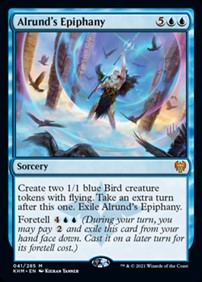Every year, there are multiple new MTG sets released. With the release of most sets, Wizards of the Coast usually tries to incorporate some new and potentially interesting mechanics.
We’ve seen a lot of keywords come and go over the years. Foretell is among more recent ones, introduced in the Kaldheim set. Newer keywords are always initially confusing, leaving both old and new Magic players with questions.
In this post, we’ll strive to answer the question of how does Foretell work in MTG. We’ll also answer a couple other common questions about the keyword and share our opinion on it.
What is Foretell and How Does it Work?

Put simply, Foretell is a keyword that was added to MTG’s lexicon with the release of Kaldheim in early 2021. This set was all about flavor. In fact, Kaldheim is what’s called a “top-down” set, which means the flavor and theme of the set were designed prior to any mechanics.
The theme is Nordic, and the cards are littered with references to ancient Norse mythology. Foretell was created to fit that theme by functioning like an omen. Here’s a quick overview of how it works:
On your turn, you pay two mana to temporarily exile a card in your hand face-down. The keyword here is “temporarily,” because you’ve basically put the card into stasis.
As part of a later turn, you may cast that card you put into exile for its Foretell cost, which is listed next to the keyword on the card. You can view an example in the above-pictured Alrund’s Epiphany. If you don’t cast those facedown cards by the end of the game, you must reveal all facedown Foretell cards at the game’s conclusion.
Foretell is optional. If you want to cast the card now, you can pay its standard cost listed in the upper righthand corner.
What are the benefits of using Foretell?
Now that you know what it is, you’re probably wondering why you’d use Foretell in the first place. There are a few benefits to the mechanic.
The first one is that it can keep your cards safe until you need to use them. There are plenty of cards out there your opponent could use to force you to discard something from your hand. There aren’t so many that can do anything to a card in exile, which is where Foretell temporarily places your cards.
Second, Foretell can occasionally save you a little mana…or at least let you break up the cost of a card. While it’s not always the case, the total Foretell cost is sometimes cheaper than the cost of the card up-front.
Even if it’s not, remember that Foretell allows you to pay it in pieces. You pay two upfront to put it out face-down, then its Foretell cost at a later time when you can afford it.
Finally, there’s the psychological factor. Think about how it looks to your opponents when you put out a card face-down.
They have no idea what it is or how much it costs. It could be something cheap that you can play at any time or it could be something expensive that you won’t be able to cast for a few turns.
The uncertainty could function as a deterrent. It may keep your opponents from attacking you or playing particular cards for fear that they will be countered.
Learn More: MTG: How Does Mutate Work?
Foretell FAQs
Is foretell instant speed?
Foretell can only be done on your turn, so it’s technically not instant-speed. However, in some ways, it’s even better.
If you have priority on your turn, you can activate Foretell to put a card into exile. The act of Foretelling is a special action that opponents cannot directly respond to.
In other words, if you have a card in your hand that you want to protect because someone else is playing a discard-themed deck, you can Foretell without worrying about them stopping you. They cannot play an instant-speed card to force you to discard the one you have chosen to Foretell.
Keep in mind that Foretell does not change the speed of the card being put into exile. If you Foretell a sorcery, it cannot be cast from exile until your next main phase. On the other hand, if you were to Foretell an instant, you would be able to cast it from exile as soon as the next turn.
You cannot cast a card that was put into exile with Foretell on the same turn you exiled it.
Does foretell count as casting?
The act of Foretelling itself is not considered casting – it is a special action that skips the stack. However, playing the card from exile for its Foretell cost after it was foretold is considered casting.
Another way to answer the question is to define casting. Casting requires players to pay a cost and then that card goes through the stack. Because Foretell is a special action and does not go through the stack, it is not casting.
Learn More Magic Mechanics: MTG: How Does Companion Work?
Wrap Up
The sheer volume of keywords in Magic: the Gathering is mindboggling. And if there’s one thing that can be said about the game, is that things are always changing.
We do our best to provide current information to your MTG questions. That being said, if you have any other questions, please let us know in the comments below.
We personally like Foretell and look forward to using it in our own decks. Have you built any decks around the mechanic yet?
